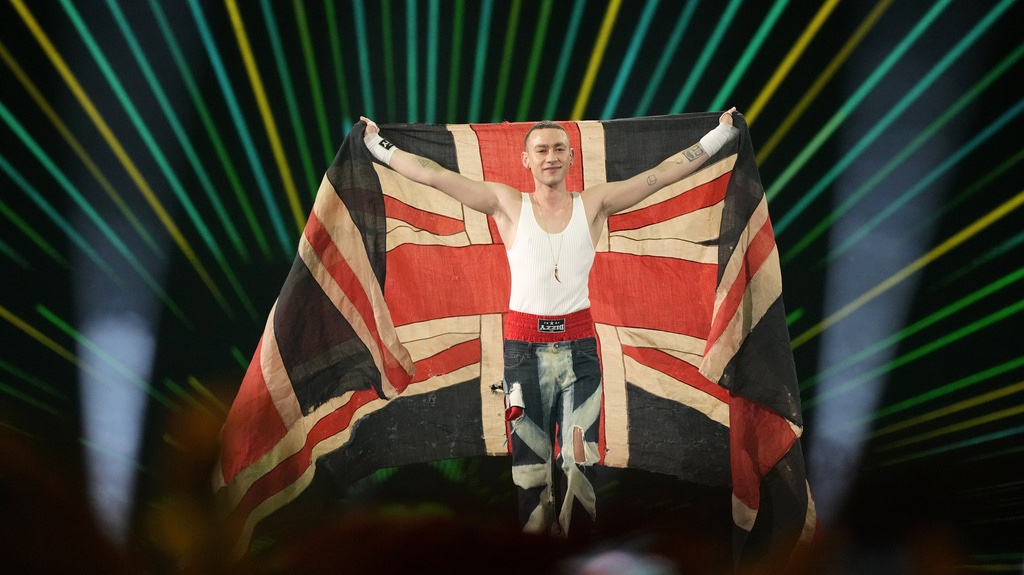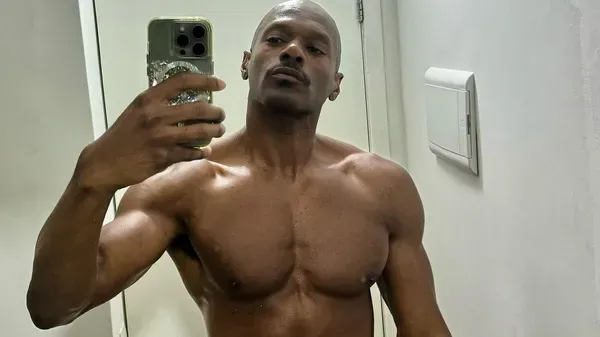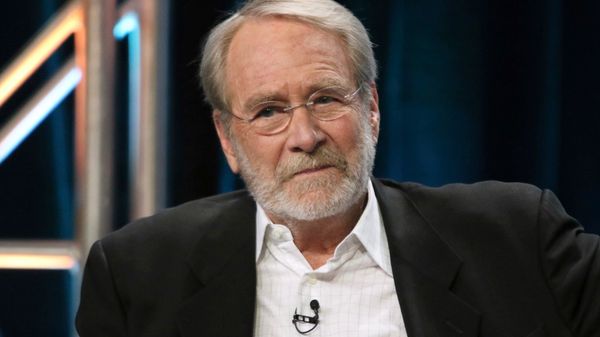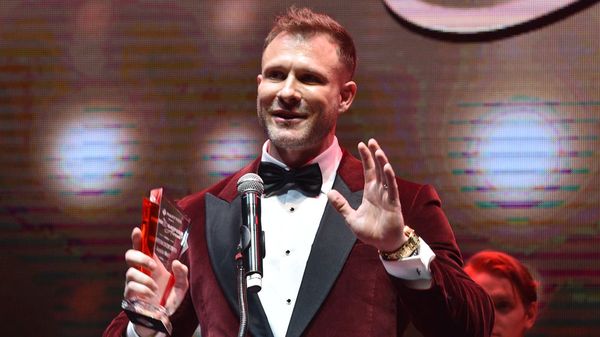
May 11
Eurovision Song Contest Final Kicks Off after Protests, Backstage Chaos and a Contestant's Expulsion
Jill Lawless READ TIME: 4 MIN.
The final of the 68th Eurovision Song Contest kicked off Saturday in the Swedish city of Malmo after days of protests and offstage drama that have tipped the feelgood musical celebration into a chaotic pressure cooker overshadowed by the war in Gaza.
A raucous Croatian rocker, a nonbinary Swiss performer with a soaring voice and – contentiously – a young Israeli singer with a powerful ballad are among favorites to win the competition, which pits nations against one another for the continent's musical crown.
Before the final, thousands of pro-Palestinian demonstrators marched through Malmo to oppose the participation of Israel. A small group – including climate activist Greta Thunberg – was escorted by police from the area around the Malmo Arena venue.
Separately, Dutch contender Joost Klein was expelled from the contest over a backstage altercation that is being investigated by police.
Competition organizer the European Broadcasting Union said a female member of the production crew had made a complaint against Klein. The organizer said it wouldn't be appropriate for Klein to participate at the event while the legal process was underway.
Klein, a 26-year-old Dutch singer and rapper, had been a favorite of both bookmakers and fans with his song "Europapa."
Dutch broadcaster AVROTROS, one of dozens of public broadcasters that collectively fund and broadcast the contest, said that as Klein came offstage after Thursday's semifinal, he was filmed without his consent and in turn made a "threatening movement" toward the camera.
The broadcaster said Klein didn't touch the camera or the female camera operator, and called his expulsion a "very heavy and disproportionate" punishment.
The protests and dissent are overshadowing a competition that has become a campy celebration of Europe's varied – and sometimes baffling – musical tastes and a forum for inclusiveness and diversity with a huge LGBT following.
Competitors from 25 nations are performing in front of a live audience of thousands and an estimated 180 million viewers around the world. Each contestant has three minutes to meld catchy tunes and eye-popping spectacle into performances capable of winning the hearts of millions of viewers. Musical styles range across rock, disco, techno and rap – sometimes a mashup of more than one.
The contest returned to Sweden, home of last year's winner Loreen, a half-century after ABBA won Eurovision with "Waterloo" – Eurovision's most iconic moment. The opening act wasn't the pop supergroup, which hasn't reunited onstage for decades. Instead, it was Björn Skifs, the first Swedish artist to score a No. 1 hit in the U.S. – in 1974 with "Hooked on a Feeling."
Sweden's entry, identical twins Marcus and Martinus, opened the competition with their optimistically named song "Unforgettable," followed by Ukrainian duo alyona alyona & Jerry Heil with "Teresa & Maria," a powerful tribute to their war-battered country.
After German balladeer Isaak and Luxembourg chanteuse Tali, Israeli singer Eden Golan took the stage to a wall of sound – boos mixed with cheers – to perform the power ballad "Hurricane." Golan has shot up the odds table despite through the week, despite the protests that her appearance has drawn.
Eurovision organizers ordered a change to the original title of her song, "October Rain" – an apparent reference to the Oct. 7 Hamas attack that killed about 1,200 people in Israel and triggered the war in Gaza.
This year's contenders also include the goofy 1990s nostalgia of Finland's Windows95man, who emerges from a giant onstage egg wearing very little clothing. Bambie Thug summons witchy spirits onstage and has brought a scream coach to Malmo, while Spain's Nebulossa boldly reclaims a term used as a slur on women in "Zorra."
The favorites include Swiss singer Nemo – who would be the first nonbinary Eurovision winner if the operatic song "The Code" tops the voting – and Croatia's Baby Lasagna. His song "Rim Tim Tagi Dim" is a rollicking rock number that tackles the issue of young Croatians leaving the country in search of a better life.
Though Eurovision's motto is "united by music," this year's event has proven divisive.
Tensions and nerves were palpable in the hours before the final. Several artists were absent from the Olympics-style artists' entrance at the start of the final dress rehearsal, though all appeared at the final.
French singer Slimane cut short his song "Mon Amour" at the dress rehearsal to give a speech urging people to be "united by music, yes – but with love, for peace."
Norwegian singer Alessandra Mele, who had been due to announce her country's jury results, said that she was withdrawing because "there is a genocide going on" and the united by music slogan was "empty words." Finland's announcer, musician Kaarija, also pulled out, saying announcing the votes "does not feel right."
Pro-Palestinian protesters argue that Israel shouldn't be allowed to take part amid a war that has killed almost 35,000 Palestinians, according to the health ministry in the Hamas-run territory.
Thousands of people marched for the second time this week on Saturday through Sweden's third-largest city, which has a large Muslim population, to demand a boycott of Israel and a cease-fire in the seven-month war.
A few Palestinian flags were waved in the auditorium during Saturday's Eurovision dress rehearsal, in defiance of a ban on flags other than those of competing nations.
Loreen, last year's Eurovision champion – and one of only two performers to win the contest twice – said world events were "traumatizing," but urged people not to shut down the "community of love" that is Eurovision.
"What heals trauma ... Does trauma heal trauma? Does negativity heal negativity? It doesn't work like that," she told The Associated Press. "The only thing that heals trauma for real – this is science – is love."
___
Hilary Fox in Malmo, Jari Tanner in Helsinki, and Jan M. Olsen in Copenhagen, Denmark, contributed to this report.






